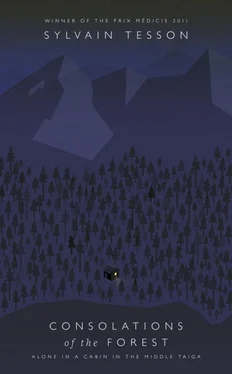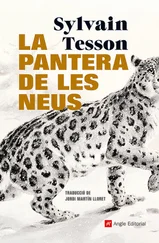3 APRIL
I’ve begun Defoe’s Robinson Crusoe , have finished Tournier’s Friday and An Island to Oneself , Tom Neale’s account of the six years he spent on the tiny deserted island of Anchorage in the atoll of Subwarrow.
One can establish certain traits characteristic of castaways, common similarities that outline the archetypical figure of the solitary survivor washed up on a shore.
A sense of injustice at the time of the shipwreck, followed by curses directed at the gods, men and sailing ships in general.
The appearance of a slightly megalomaniacal syndrome: the castaway convinces himself that he is a privileged being.
The feeling of being the lord of a realm and of ruling over all animal, vegetable and mineral subjects: ‘If I pleased, I might call myself king, or emperor over the whole country which I had possession of. There were no rivals,’ says Defoe’s Robinson.
The need to constantly confirm the merits of the solitary life by insisting to oneself at every occasion on the beauty of such an existence.
The contradictory wavering between the hope of prompt rescue and revulsion at any contact with one’s fellow man.
Panic over the slightest intrusion of human beings on the island.
Empathy with the natural world (this may take several years to appear).
An insistence on strictly regulating varying periods of action, meditation and leisure.
The temptation to transform each moment of existence into a staged game.
The slightly euphoric feeling of playing the role of an observer or watchman on the margins of a humanity gone astray.
The risk of contracting the ‘ivory tower syndrome’, which in its extreme form leads the castaway to see himself both as the repository of universal wisdom and the redeemer of the sins of mankind.
4 APRIL
Today I read a lot, skated for three hours in a Viennese light while listening to the Pastorale , caught a char and harvested a pint of bait, looked out of the window at the lake through the steam of my black tea, chopped up a tree trunk nine feet long and split two days of wood, cooked and ate some good kasha, and reflected that paradise was right there for the taking in the course of my day.
5 APRIL
Gusty weather last night. Northern winds thrashed the edge of the woods until noon. The thermometer says −9°F. What a delightful spring! When the afternoon turns mild, I begin building a table. Thick cedar branches for the legs, with a braced frame, and for the top, four planks that had been slumbering sheltered by the porch roof. Three hours of work, and by nightfall, I have my table. I take it down to the beach and set it out in the snow, where the clearing opens in front of the cedar shaped like a shell. Then I sit down on a log and lean back against the tree trunk. Those people who forbid you to put your feet on a table… do not understand the pride of a woodworker.
In the evening, I smoke a Partagás out in the cold, with my elbows on my new ‘observation deck’. The table and I, we already love each other very much. On this Earth, it’s good to lean on something.
This life brings peace. Not that all longings fade away. The cabin is no tree of Buddhist Enlightenment. A hermitage draws ambitions back to proportions of possibility. By restricting the panoply of actions, one goes deeper into each experience. Reading, writing, fishing, scaling heights, skating, strolling in the woods… Existence becomes reduced to a dozen or so activities. The castaway enjoys absolute freedom – but within the limits of his island. At the beginning of all Robinsonian narratives, the hero tries to escape by building a boat. He is convinced that anything is possible, that happiness lies just over the horizon. Cast up once again on the shore, he understands that he will not escape and, at peace, discovers that limitation brings joy. He is then said to resign himself . Resigned, the hermit? No more than the city dweller who, haggard, suddenly realizes beneath the twinkling lights of the boulevard that his whole life will still not be enough for him to sample all the attractions at the party.
6 APRIL
In the fourth century, in Upper Egypt, the shifting sand dunes of the Sahara in Wadi Natrun were swarming with monks in rags. The anchorites ran to the desert to follow in the footsteps of Saints Anthony and Pachomius. Their eyes gazed with an unhealthy light out of leathery faces. Reality horrified them: they found life degrading. Spectres nourished on lizards, they rejected the world, fearing its savours. Their sensations were their enemies. If they dreamed of a pitcher of water, they believed Satan was tempting them. They wished to die to attain the other realm, the one guaranteed by Holy Scripture to be eternal.
The hermit of the taiga is a world away from such renunciation. The mystics tried to disappear from this earth. The woodsman wants to be reconciled with it. The ascetics waited for the advent of something not of this life, while the forester seeks the serendipitous appearance of brief pleasures, here and now. They wanted eternity; he craves the granting of prayers. They hoped to die; he desires felicity. They hated their bodies; he hones his senses. In short, if you want to have a good time around a bottle of vodka, you’re better off running into a hermit in the woods rather than a holy fool perched on his pillar.
Out in those deserts, encountering one’s fellow man was an event. The anchorites forgot what a human face looked like, and when a visitor appeared, many of them fell to their knees, convinced this apparition was a demon.
Which is what happens to me when Volodya T. pops in on me this morning, arriving in a jeep to collect some belongings. Why doesn’t this damn door ever open to reveal a svelte Danish ski champion come to celebrate her twenty-third birthday on the shores of Baikal?
‘A vodka?’ I ask Volodya.
‘No,’ he says.
‘You’re not drinking?’
‘I stopped.’
‘When?’
‘Twenty years ago, before I came here. One day I woke up and my wife and children were gone. Family is better than booze. They came back later but I haven’t gone back to drinking.’
‘So, how’s your new life in Irkutsk?’
‘Not great.’
‘Why?’
‘Money. I keep having to shoot bears. I can get 6,000 roubles for a skin, a month’s salary! I’ve promised one to two or three people who’ve already paid me.’
‘In France we have a saying about people who sell a bearskin before…’
‘I know, don’t tell me. So do we.’
‘Really, not even one small vodka?’
‘No, I told you, fucking hell.’
7 APRIL
A whole hour cleaning the cabin. My reed broom works wonders. I sponge off the oilcloth and polish the windows with vodka. Since it’s housekeeping day, I prepare my banya. In the evening, shiny as a rouble, I’m at the table with my glass of vodka, the kasha is cooking, the kettle’s on, the candles are dripping and the lake is creaking: everything’s in its place doing its duty. The barometer is dropping like a stone; I can hear the tops of the cedars whistling…
8 APRIL
Storm.
All that’s left of my life are the notes. I’m keeping a diary, as a supplement to memory, to stave off forgetting. Without a record of one’s exploits, what’s the point of living? The hours stream by, and each day vanishes into a triumph of nothingness. The private diary: a commando operation against the absurd.
I archive the passing hours. Keeping a journal makes life fruitful. The daily appointment with the blank page forces one to pay better attention to the doings of the day – to listen harder, to think more clearly, to see more intently. It would be grim to have nothing to inscribe in one’s notebook in the evening. The daily composition is like having dinner with a fiancée: in order to know what to tell her later on, it’s best to think about it during the day.
Читать дальше












